Reblogged from TheTorah.com – A Historical and Contextual Approach
[1] See M. Zipor, Tradition and Transmission: Studies in Ancient Biblical Translation and Interpretation [Heb.] (Tel Aviv, 2001), pp. 79-165. The sources were collected by C. D. Ginsburg, Introduction to the Massoretico-Critical Edition of the Hebrew Bible (second edition: New York, 1966), 347-363.
[2] Or perhaps just before classical rabbinic times, in the period of the so-called Men of the Great Assembly (אנשי הכנסת הגדולה).
[3] Beshalah 16.
[4] Hellenism in Jewish Palestine (New York, 1962), p. 35, quoting b. Yevamot 79a.
[5] Lieberman, p. 37. See also Michael Fishbane’s chapter, “Pious Revisions and Theological Addenda,” in his Biblical Interpretation in Ancient Israel (Oxford, 1985), pp. 66-75.
[6] ספרי במדבר פרשת בהעלותך פיסקא פד.
[7] The standard interpretation sees YHWH here as the name of the deity; Rashbam, however, sees it as the name of one of the three angels. See my Rabbi Samuel ben Meir’s Commentary on Genesis, pp. 58-59 and my Peirush Rashbam al ha-Torah, pp. 20-21. The need for a scribal correction here could be argued according to either understanding of YHWH.
[8] This example is also discussed in Ben Katz’s TABS essay on Parashat Vayera, “God’s Appearance to Abraham: Vision or Visit.” Katz works with the assumption that the scribes did in fact alter the verse from what it said originally.
[9] Bereshit Rabbah 49, p. 505 in the Theodor-Albeck edition.
[10] Ginsburg (above note 1), p. 353.
[11] Livorono, 1475. This book was one of the first Hebrew books ever printed. Scholars generally believe that it preserves a very reliable version of Rashi’s commentary for the most part.
[12] Rashi and Rashbam both think YHWH’s words in vss. 20-21 are directed to Abraham.
[13] In two other places in his Bible commentary Rashi seems to assume that a “scribal correction” means that a later hand changed the text (commentary to Job 32:3 and Mal 1:13), but the language there is not as clear. See the discussion in Yeshayahu Maori, “Tiqqun Soferim and Kinah Hakkatuv in the Commentary of Rashi to the Bible” [Heb.], in Netiot leDavid: Jubilee Volume for David Weiss Halivni, ed. Y. Elman et al, (Jerusalem, 2005), pp. 104-105.
[14] Berliner was one of the leading religious scholars of the “Science of Judaism” approach in the nineteenth century. Among other activities, he was one of the editors of the prestigiousMagazin für die Wissenschaft des Judenthums.
[15] See also Menahem Kasher’s Torah Sheleimah on the verse in Genesis. Kasher follows Berliner’s opinion that Rashi could not have written those words.
[16] Pp. xiv-xv.
[17] Rabbi Solomon ibn Adret (the Rashba, 1235-1310), Rabbi Eliyyahu Mizrahi (1435-1526), the most famous of Rashi’s super-commentaries, the Minhat Shai commentary of Rabbi Yedidyah Norzi (1560-1626) and Me’or Einayim of Azariah de Rossi (1513-1578). The first three of these, however, never suggest a different reading of Rashi’s commentary. They only argue for the understanding of the phrase “scribal correction” in classical rabbinic sources as meaning self-censorship done by the original authors.
[18] De Rossi seems to be an unusual candidate for the role of defender of Rashi’s orthodoxy. De Rossi was one of the first Jewish history writers to use many aspects of scientific method in his writings, and he himself was accused of unacceptable heterodoxy by some of the leading rabbis of his time.
[19] Me’or einayim, chapter 19 (Vilna, 1865), p. 232.
[20] Commentary to Gen 18:22.
[21] Little is known about Bokrat who was active in the fifteenth and sixteenth centuries and was among the Jews expelled from Spain. His Sefer ha-zikkaron was published in a good edition by Moshe Filip (Petah Tiqva, 1985). For a brief analysis of Bokrat’s approach, see the introductory essay in my Rashbam’s Commentary on Deuteronomy: An Annotated Translation (Providence, 2003), pp. 11-15.
[22] See Elazar Touitou, “Concerning the Presumed Original Version of Rashi’s Commentary on the Pentateuch” [Heb.], Tarbiz 56 (1987), 211-242, esp. p. 231, note 30; Yeshayahu Maori, “Tiqqun Soferim and Kinah Hakkatuv in the Commentary of Rashi to the Bible” [Heb.], inNetiot leDavid: Jubilee Volume for David Weiss Halivni, ed. Y. Elman et al, (Jerusalem, 2005), 99-109; and Aharon Mondschein, “Rashi, Rashbam and ibn Ezra on the Phenomenon of Tiqqun Soferim,” [Heb] in Studies in Bible and Exegesis 8 (2008), 409-450. As Mondschein and Maori both point out, despite the fact that Touitou found the problematic four words in the preponderance of Rashi manuscripts, Touitou did not consider the words part of Rashi’s original commentary. Mondschein (especially p. 412, note 13) and Maori (especially p. 103, note 19), argue convincingly against Touitou.
[23] The Ha-keter edition (Ramat Gan, 1992-2013). Maori (ibid.) quotes the unpublished rationale of Professor Menahem Cohen, the editor of Ha-keter, for his decision to print these four words in the Ha-keter edition as part of the original text of Rashi’s commentary. See also H. Dimitrovski’s notes in his edition of Rashba’s responsa, p. 178: ונר’ שזהו הנוסח האמיתי בלשון רש”י.
[24] Such attempts to rewrite history and “clean up” the work of an earlier rabbi are not so rare. See e.g. my Rashbam’s Commentary on Leviticus and Numbers: An Annotated Translation, pp. 260-261, where I argue that Rashbam’s commentary to Num 22:1 was altered for religious ideological reasons. And see more generally Marc Shapiro’s recent book,Changing the Immutable: How Orthodox Judaism Rewrites its History, concerning the phenomenon in contemporary times.
[25] Maimonides, commentary on the Mishnah, Sanhedrin 10.
Categories: Bible, Biblical scholarship, Judaism
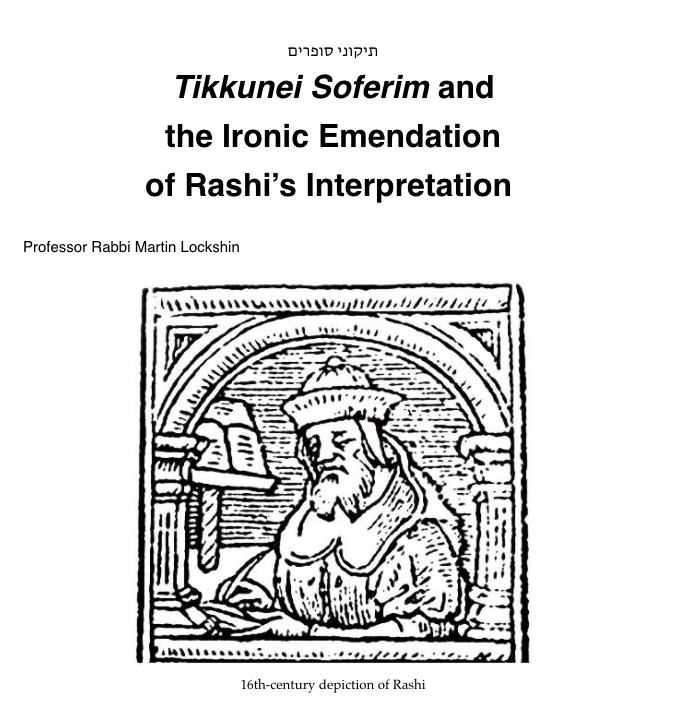
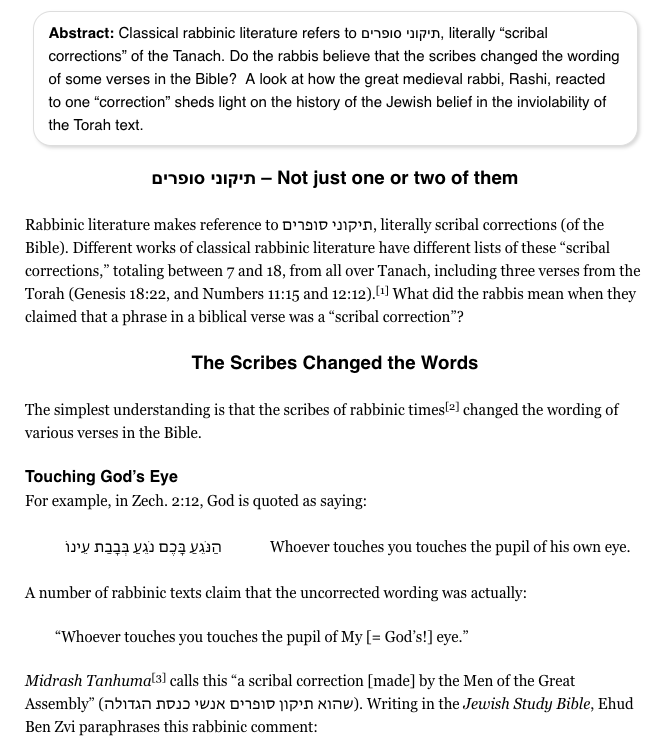
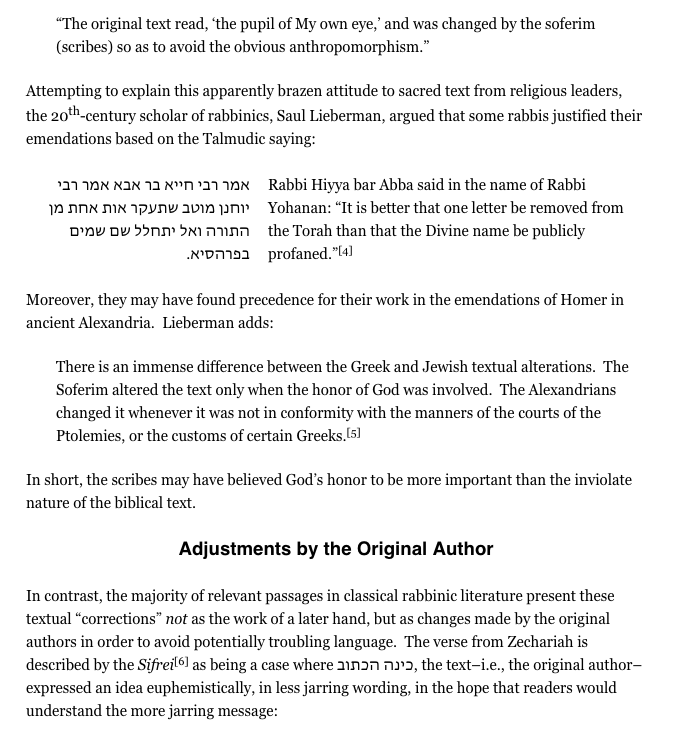

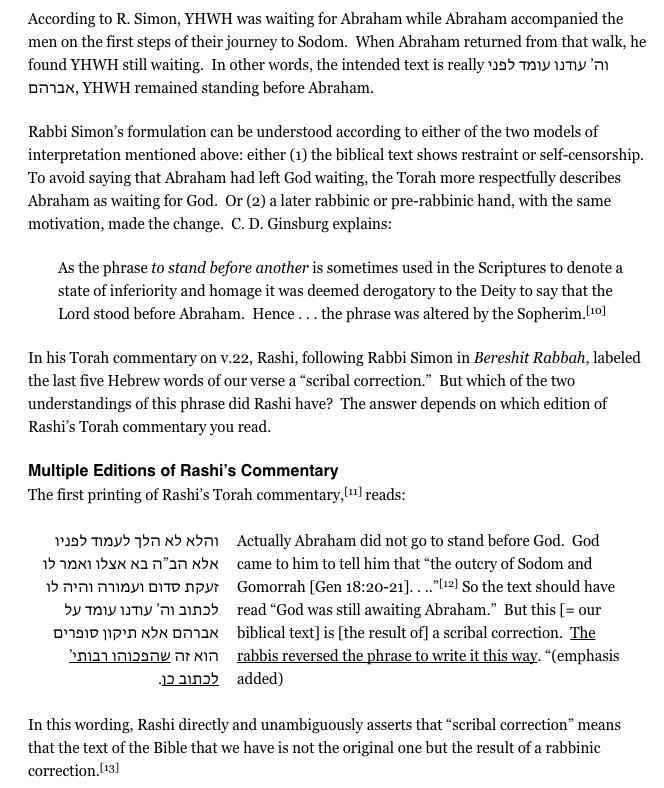

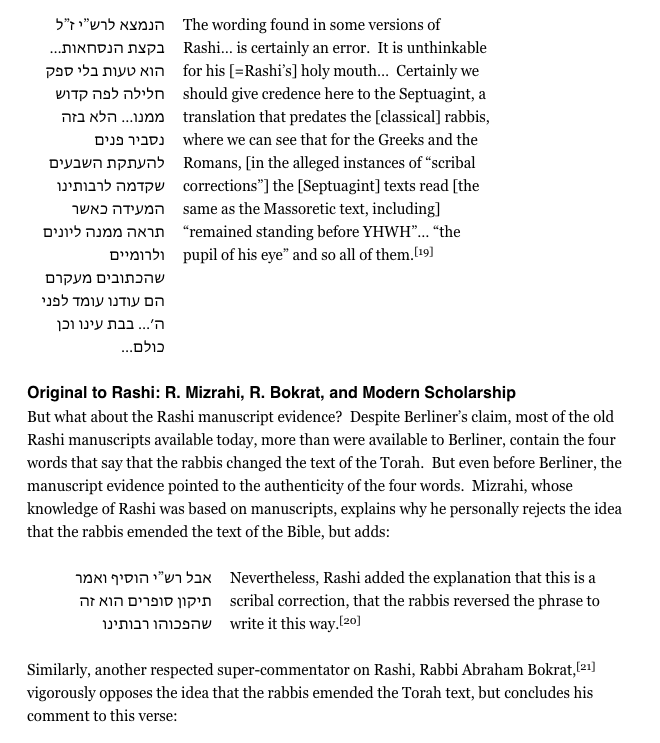
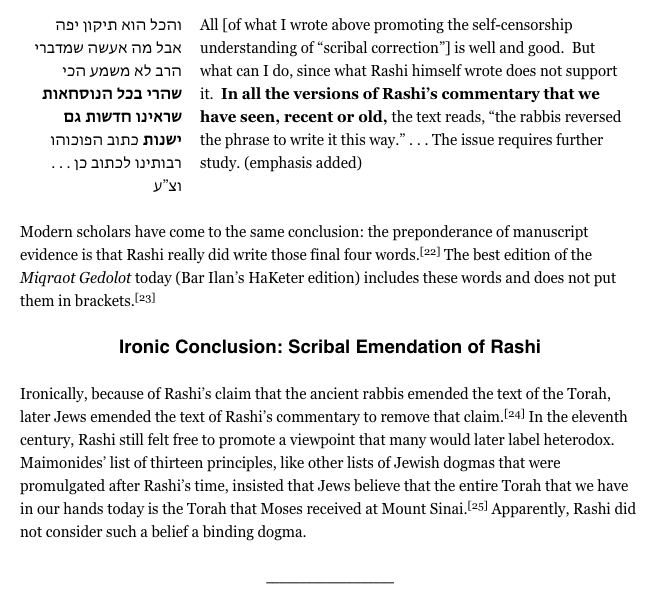
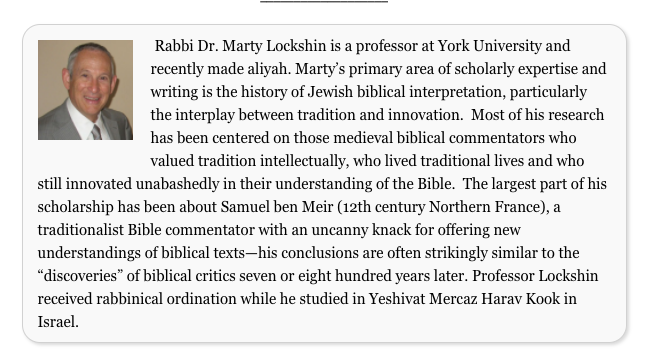
It goes without saying that this vindicates the Quran’s position on the Torah.
LikeLiked by 6 people
Do you covet [the hope, O believers], that they would believe for you while a party of them used to hear the words of Allah and then distort the Torah after they had understood it while they were knowing? So woe to those who write the “scripture” with their own hands, then say, “This is from Allah ,” in order to exchange it for a small price. Woe to them for what their hands have written and woe to them for what they earn. – Qur’an 2:75,79
LikeLiked by 1 person
Thank you Br. Paul Williams you’ve written a great piece I also want to share just one example of Mans words mixed with God?
Formerly, in Israel, when a man went to inquire of God, he would say thus, “Come and let us go to the seer,” for he who is called a prophet today, was formerly called a seer. (1 Samuel 9:9)
———————————————-
Scholars of the bible agree the author inserted his own words, and wrote it as though its part of inspired text!
( Bible Rashis commentary )
Formerly in Israel: The author wrote this. This is not part of the statement of Saul’s servant.
———————————————-
Pulpit commentary
Verse 9. – Beforetime, etc. This verse is evidently a gloss, written originally by some later hand in the margin, in order to explain the word used for seer in vers. 11, 18, 19.
How can you call this the word of god when the authors marginal texts became part of the bible?. The fact these texts were added shows how easily mans word can creep inside the bible and be taken as inspired word of God . Notice the God of the bible was unable to preserve his book. This is just one example out of many.
LikeLiked by 2 people
It vindicates the Qur’an.
LikeLiked by 1 person
It goes without saying that if this is your best then you are more pathetic than your profit.
First, if these changes mean the Torah has been corrupted then this only proves your profit was truly an ignoramus who didn’t know what he was talking about since, contrary to your boldfaced lie, he actually confirmed the incorruptibility of the previous Scriptures, especially the Torah.
Children of Israel, remember My blessing wherewith I blessed you, and fulfil My covenant and I shall fulfil your covenant; and have awe of Me. And believe in that I have sent down, confirming that WHICH IS WITH YOU, and be not the first to disbelieve in it. And sell not My signs for a little price; and fear you Me. And do not confound the truth with vanity, and do not conceal the truth wittingly. And do not confound the truth with vanity, and do not conceal the truth wittingly. And perform the prayer, and pay the alms, and bow with those that bow. Will you bid others to piety, and forget yourselves WHILE YOU RECITE THE BOOK? Do you not understand? S. 2:40-44
And they say, ‘Our hearts are uncircumcised.’ Nay, but God has cursed them for their unbelief; little will they believe. When there came to them a Book from God, confirming WHAT WAS WITH THEM — and they aforetimes prayed for victory over the unbelievers — when there came to them that they recognized, they disbelieved in it; and the curse of God is on the unbelievers… And when they were told, ‘Believe in that God has sent down,’ they said, ‘We believe in what was sent down on us’; and they disbelieve in what is beyond that, yet it is the truth confirming WHAT IS WITH THEM. S. 2:89, 91
When there has come to them a Messenger from God confirming WHAT WAS WITH THEM, a party of them that were given the Book reject the Book of God behind their backs, as though they knew not, S. 2:101
You who have been given the Book, believe in what We have sent down, confirming WHAT IS WITH YOU, before We obliterate faces, and turn them upon their backs, or curse them as We cursed the Sabbath-men, and God’s command is done. S. 4:47
The Quran also claims that the Jews and Christians of Muhammad’s time were studying and reciting the Book, thereby implying that they possessed the original, uncorrupt Scriptures:
The Jews say, ‘The Christians stand not on anything’; the Christians say, ‘The Jews stand not on anything’; YET THEY RECITE THE BOOK. S. 2:113
Those to whom We have given the Book and who recite it WITH TRUE RECITATION, they believe in it; and whoso disbelieves in it, they shall be the losers. S. 2:121
It belongs not to any mortal that God should give him the Book, the Judgment, the Prophethood, then he should say to men, ‘Be you servants to me apart from God.’ Rather, ‘Be you masters in that YOU KNOW THE BOOK, and in that YOU STUDY.’ S. 3:79
Those are they to whom We gave the Book, the Judgment, the Prophethood; so if these disbelieve in it, We have already entrusted it to a people who do not disbelieve IN IT. Those are they whom God has guided; so follow their guidance. Say: ‘I ask of you no wage for it; it is but a reminder unto all beings.’ They measured not God with His true measure when they said, ‘God has not sent down aught on any mortal.’ Say: ‘Who sent down the Book that Moses brought as a light and a guidance to men? YOU OUT IT INTO PARCHMENTS, REVEALING THEM, AND HIDING MUCH; and you were taught that you knew not, you and your fathers.’ Say: ‘God.’ Then leave them alone, playing their game of plunging. This is a Book We have sent down, blessed and confirming that which was before it (Ar. musaddiqu alathee bayna yadayhi – lit. confirming that which is between his/its hands), and for thee to warn the Mother of Cities and those about her; and those who believe in the world to come believe in it, and watch over their prayers. S. 6:89-92
Of the people of Moses there is a nation who guide by the truth, and by it act with justice… And there succeeded after them a succession who inherited the Book, taking the chance goods of this lower world, and saying, ‘It will be forgiven us’; and if chance goods the like of them come to them, they will take them. Has not the compact of the Book been taken touching them, that they should say concerning God nothing but the truth? AND THEY HAVE STUDIED WHAT IS IN IT; and the Last Abode is better for those who are godfearing. Do you not understand? And those who hold fast to the Book, and perform the prayer — surely We leave not to waste the wage of those who set aright. S. 7:159, 169-170
Muhammad even called the Jews and Christians to judge by their respective Scriptures, which again presupposes that these communities possessed the original, genuine revelations of God.
Hast thou not regarded those who were given a portion of the Book, being called to the Book of God, THAT IT MIGHT DECIDE BETWEEN THEM, and then a party of them turned away, swerving aside? S. 3:23
Here is how the Muslim expositors explained this particular text:
Have you not seen those who were given a portion, a share, of the Book, the Torah, being called to the Book of God (yud‘awna, ‘being called’, is a circumstantial qualifier), that it might decide between them, and then a party of them turned away, opposed? to the acceptance of its rulings. This was revealed concerning the Jews: two of them fornicated and they [the Jews] asked the Prophet to adjudicate the case. He ruled that they be stoned, but they [the Jews] refused to do so. WHEN THE TORAH WAS BROUGHT AND CONSULTED, the same verdict was found, and so the two were stoned, but they [the Jews] became wrathful. (Tafsir al-Jalalayn http://altafsir.com/Tafasir.asp?tMadhNo=0&tTafsirNo=74&tSoraNo=3&tAyahNo=23&tDisplay=yes&UserProfile=0&LanguageId=2; bold, capital and underline emphasis ours)
(Hast thou not seen how those who have received a portion of the Scripture…) [3:23]. There is a difference of opinion about this verse’s occasion of revelation. Al-Suddi said: “When the Prophet called the Jews to embrace Islam, al-Nu‘man ibn Awfa said to him: ‘Come, O Muhammad, and let the rabbis judge between us’. He said: ‘Let the Scripture of Allah be judge between us’. They said: ‘No! Let the rabbis judge’. And so Allah, exalted is He, revealed this verse”. On the other hand, Sa‘id ibn Jubayr and ‘Ikrimah reported that Ibn ‘Abbas said: “The Messenger of Allah entered in on a group of Jews in a Jewish place of study and called them to Allah. Nu‘aym ibn ‘Amr and al-Harith ibn Zayd said to him: ‘O Muhammad, which religion are you on?’ He said: ‘The religion of Abraham’. They said: ‘But Abraham was a Jew’. The Messenger of Allah said: ‘In that case, let us go to the Torah and let it judge between us’. They refused. And Allah, exalted is He, revealed this verse”. Said al-Kalbi: “This was revealed about those who committed fornication in Khaybar and the Jews who asked the Prophet about the legal punishment of fornication”. The elaboration on this will come in Surah al-Ma’idah, Allah, exalted is He, willing”. (‘Alī ibn Ahmad al-Wahidi, Asbab Al-Nuzul, trans. Mokrane Guezzou http://altafsir.com/Tafasir.asp?tMadhNo=0&tTafsirNo=86&tSoraNo=3&tAyahNo=23&tDisplay=yes&UserProfile=0&LanguageId=2; bold and underline emphasis ours)
Other Quranic verses which command the Jews and Christians to judge by their respective books include the following:
All food was lawful to the Children of Israel save what Israel forbade for himself before the Torah was sent down. Say: ‘Bring you the Torah now, and recite it, if you are truthful.’ Whoso forges falsehood against God after that, those are the evildoers. S. 3:91
Yet how will they make thee their judge seeing THEY HAVE THE TORAH, wherein IS God’s judgment, then thereafter turn their backs? They are not believers. Surely We sent down the Torah, wherein IS guidance and light; thereby the Prophets who had surrendered themselves gave judgment for those of Jewry, as did the masters and the rabbis, following such portion of God’s Book as they were given to keep and were witnesses to. So fear not men, but fear you Me; and sell not My signs for a little price. Whoso judges not according to what God has sent down — they are the unbelievers. And therein We prescribed for them: ‘A life for a life, an eye for an eye, a nose for a nose, an ear for an ear, a tooth for a tooth, and for wounds retaliation’; but whosoever forgoes it as a freewill offering, that shall be for him an expiation. Whoso judges not according to what God has sent down — they are the evildoers. And We sent, following in their footsteps, Jesus son of Mary, confirming the Torah before him (Ar. musaddiqan lima bayna yadayhi minal-tawrati–confirming that which is between his hands of the Torah) and We gave to him the Gospel, wherein IS guidance and light, and confirming the Torah before it (Ar. wa’musaddiqan lima bayna yadayhi minal-tawrati), as a guidance and an admonition unto the godfearing. So let the People of the Gospel judge according to what God has sent down THEREIN. Whosoever judges not according to what God has sent down — they are the ungodly. S. 5:43-47
The obvious question to ask at this point is, why in the world would Muhammad exhort the Jews and Christians to judge by corrupted texts that no longer reflected what the original revelations actually taught? Doesn’t this refute the common Muslim assertion that the previous Scriptures had been corrupted, and that the Jews and Christians therefore no longer had them in their possessions?
In light of this fact, notice how Ibn Kathir, one of the greatest Muslm scholars that ever lived, interpreted this specific text:
“… The Prophet recited…
<> So they brought the Tawrah and read from it until the reader reached the verse about stoning. Then he placed his hand on that verse and read what was before and after it. `Abdullah bin Salam, who was with the Messenger of Allah , said, “Order him to remove his hand,” and he removed his hand and under it was the verse about stoning. So the Messenger of Allah commanded that the adulterers be stoned, and they were stoned. `Abdullah bin `Umar said, “I was among those who stoned them and I saw the man shading the woman from the stones with his body.” Abu Dawud recorded that Ibn `Umar said, “Some Jews came to the Messenger of Allah and invited him to go to the Quff area. So he went to the house of Al-Midras and they said, ‘O Abu Al-Qasim! A man from us committed adultery with a woman, so decide on their matter.’ They arranged a pillow for the Messenger of Allah and he sat on it and said…
<> He was brought the Tawrah and he removed the pillow from under him AND PLACED THE TAWRAH ON IT, saying…
<> He then said…
<> So he was brought a young man… and then he mentioned the rest of the story that Malik narrated from Nafi`. These Hadiths state that the Messenger of Allah issued a decision that conforms with the ruling in the Tawrah, not to honor the Jews in what they believe in, for the Jews were commanded to follow the Law of Muhammad only. Rather, the Prophet did this because Allah commanded him to do so. He asked them about the ruling of stoning in the Tawrah to make them admit to what the Tawrah contains and what they collaborated to hide, deny and exclude from implementing for all that time. They had to admit to what they did, although they did it while having knowledge of the correct ruling… (Tafsir Ibn Kathir, Q. 5:41 http://www.qtafsir.com/index.php?option=com_content&task=view&id=776&Itemid=60; bold, capital and underline emphasis ours)
Pay careful attention to Muhammad’s reverential treatment of the copy of the Torah that the Jews had in their possession. Instead of telling the Jews that what they had was a defective, corrupt copy of the original Torah, Muhammad actually praises their very own copy by confessing his complete trust in its textual veracity and authority!
Here is a final passage:
But had the People of the Book believed and been godfearing, We would have acquitted them of their evil deeds, and admitted them to Gardens of Bliss. Had they performed the Torah and the Gospel, and what was sent down to them from their Lord, they would have eaten both what was above them, and what was beneath their feet. Some of them are a just nation; but many of them — evil are the things they do… Say: ‘People of the Book, you do not stand on anything, until you perform the Torah and the Gospel, and what was sent down to you from your Lord.’ And what has been sent down to thee from thy Lord will surely increase many of them in insolence and unbelief; so grieve not for the people of the unbelievers. S. 5:66-68
Muslim biographer Ibn Ishaq provides the supposed historical context behind the “revelation” of the foregoing verses:
Rafi b. Haritha and Sallam b. Mishkam and Malik b. al-Sayf and Rafi b. Huraymila came to him [Muhammad] and said: ‘Do you not allege that you follow the religion of Abraham and believe in the Torah WHICH WE HAVE and testify that it is the truth from God?’ He replied, ‘CERTAINLY, but you have sinned and broken the covenant CONTAINED THEREIN and concealed what you were ordered to make plain to men, and I dissociate myself from your sin.’ They said, ‘We hold by WHAT WE HAVE. We live according to the guidance and the truth and we do not believe in you and we will not follow you.’ So God sent down concerning them: ‘Say, O Scripture folk, you have no standing until you observe the Torah and the Gospel and what has been sent down from your Lord. What has been sent down to thee from they Lord will assuredly increase many of them in error and unbelief. But be not sad because of the unbelieving people.’ (The Life of Muhammad: A Translation of Ibn Ishaq’s Sirat Rasul Allah, with introduction and notes by Alfred Guillaume [Oxford University Press, Karachi, Tenth impression 1995], p. 268; bold and capital emphasis ours)
Here was Muhammad’s chance to plainly tell the Jews that they had corrupted the text of the Torah. Instead, Muhammad tells them quite clearly that he fully believed the Torah which they possessed.
So thank you for proving your profit was a fraud who didn’t know what he was talking about.
LikeLike
I wonder wether Shamoun’s long posts reflect an attempt to compensate for shortcomings in his physical or mental being.
LikeLiked by 3 people
Sad thing is no one will read them.
LikeLiked by 4 people
The second problem you face is that if these minor changes are proof that the Torah has been corrupted so that we do not know what it actually said then you just buried your Quran with all of its thousands of textual corruptions, deletions, additions etc. In fact, your own Muslim sources claim that the Qur’an underwent revisions under Iraq’s governor al-Hajjaj Ibn Yusuf (A.D. 660-714). Abi Dawud notes:
“Altogether al-Hajjaj Ibn Yusuf made eleven modifications in the reading of the Uthmanic text… In al-Baqarah (Surah 2:259) it originally read Lam yatasannah waandhur, but it was altered to lam yatasannah… In al-Maj. (sura 5:48) it read shari ya’aten wa minhaajan but it was altered to shir ‘atawwa minhaajan.” (John Gilchrist, Jam’ Al-Qur’an – The Codification of the Qur’an Text A Comprehensive Study of the Original Collection of the Qur’an Text and the Early Surviving Qur’an Manuscripts, [MERCSA, P.O. Box 342 Mondeor, 2110 Republic of South Africa, 1989], Chapter 5. Sab’at-I-Ahruf in the Hadith Literature, p.109 – citing Ibn Dawud’s Kitab al-Masahif, p.117)
And a Christian apologist named Abd al-Masih al-Kindi, wrote an apology titled The Apology of Al-Kindi at the Court of al-Mamun circa A.D. 830, approximately forty years before al-Bukhari compiled his hadith collection. Al-Kindi not only mentions the revisions that al-Hajjaj introduced to your Quran, but also mentions the Muslim reaction to the conflicting readings that existed amongst the different Quranic codices that circulated shortly after Muhammad’s death:
“… Then the people fell to variance in their reading; some read according to the version of ‘Ali, which they follow to the present day; some read according to the collection of which we have made mention; one party read according to the text of ibn Mas’ud, and another according to that of Ubai ibn Ka’b. When ‘Uthman came to power, and people everywhere differed in their reading, ‘Ali sought grounds of accusation against him. One man would read verse one way, and another man another way; and there was change and interpolation, some copies having more and some less. When this was represented to ‘Uthman, and the danger urged of division, strife, and apostasy, he thereupon caused to be collected together all the leaves and scraps that he could, together with the copy that was written out at the first. But they did not interfere with that which was in the hands of ‘Ali, or of those who followed his reading. Ubai was dead by this time, as for Ibn Mas’ud, they demanded his exemplar, but he refused to give it up. Then they commanded Zaid ibn Thabit, and with him ‘Abdallah ibn ‘Abbas, to revise and correct the text, eliminating all that was corrupt; they were instructed, when they differed on any reading, word, or name, or to follow the dialect of the Quraish.
“When the recension was completed, four exemplars were written out in large text; one was sent to Mecca, and another to Medina; the third was dispatched to Syria, and is to this day at Malatya; the fourth was deposited in Kufa. People say that this last copy is still extant at Kufa, but this is not case, for it was lost in the insurrection of Mukhtar (A.H. 67). The copy of Mecca remained there till the city was stormed by Abu Sarayah (A.H. 200); he did not carry it away; but it is supposed to have been burned in the conflagration. The Medina exemplar was lost in the reign of terror, that is, in the days of Yazid b. Mu’awiah (A.H. 60-64).
“After what we have related above, ‘Uthman called in all the former leaves and copies, and destroyed them, threatening those held any portion back; and so only some scattered remains, concealed here and there, survived. Ibn Mas’ud, however, retained his exemplar in his own hands, and it was inherited by his posterity, as it is this day; and likewise the collection of ‘Ali has descended in his family.
“Then followed the business of Hajjaj b. Yusuf, who gathered together every single copy he could lay hold of, and caused to be omitted from the text a great many passages. Among these, they say, were verses revealed concerning the House of the Umayyah with names of certain persons, and concerning the House of ‘Abbas also with names. Six copies of the text thus revised were distributed to Egypt, Syria, Medina, Mecca, Kufa, and Basra. After that he called in and destroyed all the preceding copies, even as ‘Uthman had done before him. The enmity subsisting between ‘Ali and Abu Bakr, ‘Umar and ‘Uthman is well known; how each of these entered in the text whatever favored his own claims, and left out what was otherwise. How, then, can we distinguish between the genuine and the counterfeit? And what about the losses caused by Hajjaj? The kind of faith that this tyrant held in other matters is well-known; how can we make an arbiter as to the Book of God a man who never ceased play into the hands of the Umayyads whenever he found opportunity?” (Ibn Warraq, pp. 108-109)
Mingana concludes:
“Then al-Kindi, addressing his Muslim friend, says: ‘All that I have said is drawn from your own authorities, and no single argument has been advanced but what is based on evidence accepted by yourselves; in proof thereof, we have the Kur’an itself, which is a confused heap, with neither system nor order.’” (The Origins of the Koran – Classic Essays on Islam’s Holy Book, ed. by Ibn Warraq [Prometheus Books, Amherst NY, 1998], pp. 109-110)
So what was that about textual corruption?
LikeLike
The final problem with your assertion is that this post actually backfires against you and proves that the Torah has been preserved. After all, HOW DID THESE JEWS KNOW THAT CHANGES WERE MADE TO THE TORAH IF THEY DIDN’T KNOW WHAT THE ORIGINAL WORDING OF THE TORAH HAPPENED TO BE? You see what Islam has done to your brain? it has pretty destroyed all of your moral and mental faculties since you have become just as illiterate and immoral as your profit.
To add to your woes, your source is speaking of copies in the possession of Hebrew Scribes long after the time of Christ. HOWEVER, THERE WERE COPIES OF THE OLD TESTAMENT IN THE HANDS OF CHRISTIANS IN GREEK, LATIN, SYRIAC, COPTIC, ARMENIAN ETC. WHICH WOULD MAKE IT HUMANLY IMPOSSIBLE FOR THE TORAH TO HAVE BEEN SO CORRUPTED SO AS TO NO LONGER REFLECT WHAT THE ORIGINAL SAID!
Beyond, WE NOW HAVE THE DEAD SEA SCROLLS WHICH CONTAIN COPIES OF THE HEBREW BIBLE WRITTEN ANYWHERE FROM 1-200 YEARS BEFORE CHRIST, WHICH THESE LATER HEBREW SCRIBES DID NOT HAVE ACCESS TO, AND THEREFORE COULD NOT CORRUPT!
I hope you don’t mind the caps since I am hoping this will help cure you of your illiteracy and deceit, and show you just how stupid this post ends up making you look. No wonder you would never debate me since you know I would have a field day with you and your profit.
So once again Williams, thank you for helping expose you and your profit for the glory of Jesus! Much appreciated.
LikeLike
Try reducing the word count in your comments, people might be interested enough to read it then.
LikeLiked by 5 people
No one reads Sams website so he posts his full articles on on this blog hoping someone will be bored enough to read them! Pathetic.
LikeLiked by 5 people
Sam,
I am born a Muslim. I wish you well. I hope you and your family are doing well. Let us reason together and follow the truth wherever it leads.
Sam, even though objective evidence establishes the teachings of Qur’an as the truth, this does not necessarily mean that a given Muslim born in Islam is better than a given non Muslim not born in Islam.
However, God gave us intellect and gave to each of us the strength to challenge our dogmas and desires and prior conditioning if we steadfastly put out such efforts against our conditioning and ideological desires.
So let us accept Islam if it makes sense to enhance our eternal hereafter.
Let us not use gymnastics to try to persuade ourselves or others of illogical dogmas such as Trinity or immoral ideas of God or anyone innocent suffering dying for others.
Again, I wish you the very best.
Paul, salam alaykum. Thank you for a very good post. Yes, it vindicates the Qur’an. There is so much in the last few centuries that vindicates the Qur’an.
I ask all my non Muslim brothers and sisters to read the Qur’an with an open mind and open heart.
I ask them for them to use love of truth and love and God to shore up the strength to leave aside their dogmas when they read the Qur’an and be ready to change for God loves when we use the reason and morality He gave us.
LikeLiked by 1 person
I just checked the Hebrew in first example given in this post and it is wrong. Easily wrong.
Zec 2:8 For the LORD of Hosts says this: “He (God) has sent Me (messenger) for His glory against the nations who are plundering you, for anyone who touches you (Israel) touches the pupil of His (God’s) eye.
The Hebrew as it stands now does say God’s eye. The pronoun as it stands refers to God. If the original reading was “my” it would refer to the messenger.
The comments in this post are exegetical comments. Textual evidence would be convincing but these comments are exegetical.
LikeLike
Samuel you are not a Hebrew scholar.
LikeLike
Paul. That is a good ad hominem argument. I can read well enough to engage with this article.
LikeLike